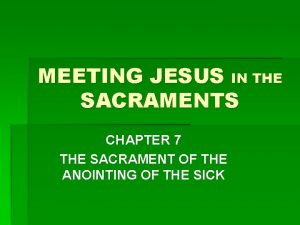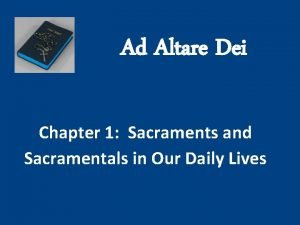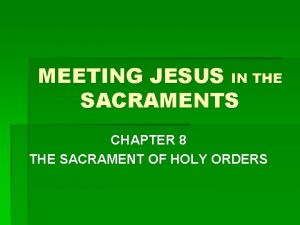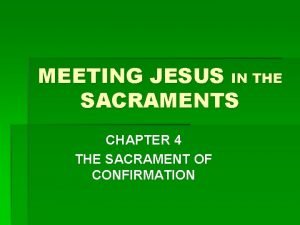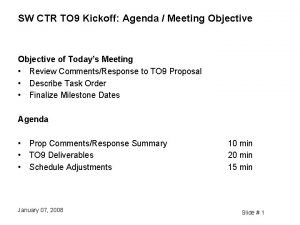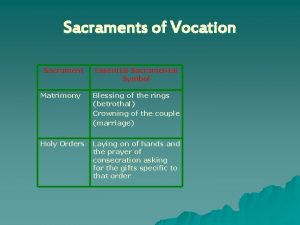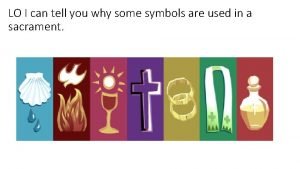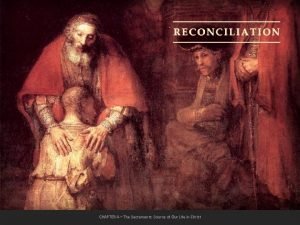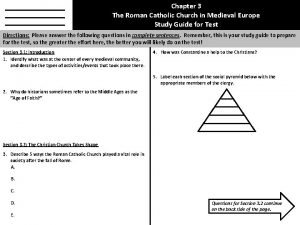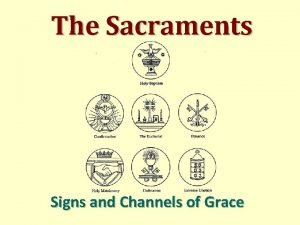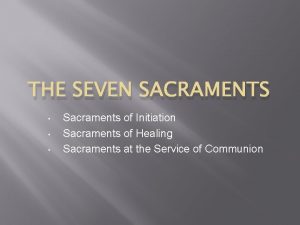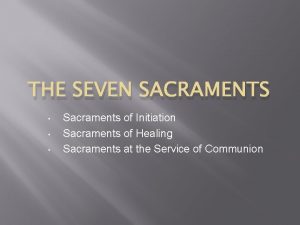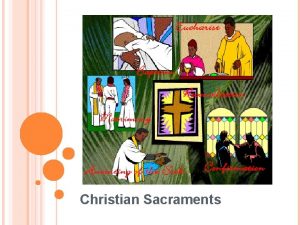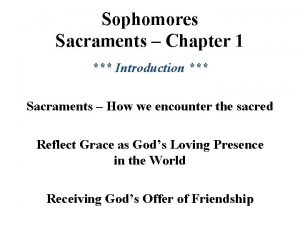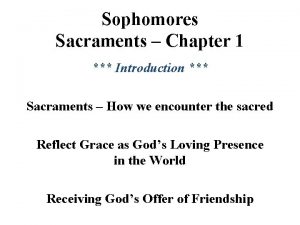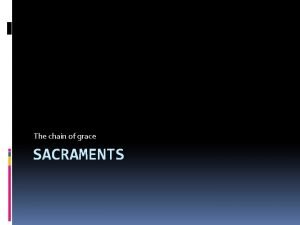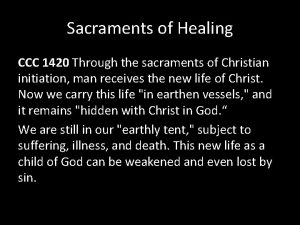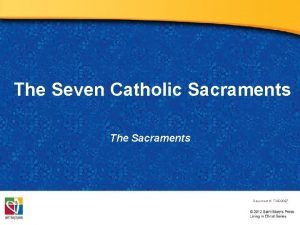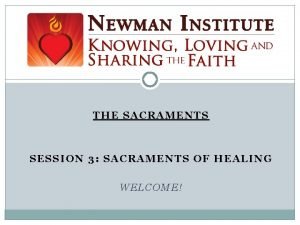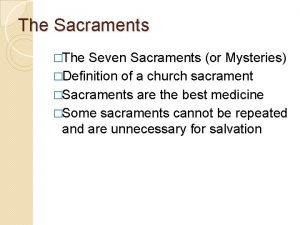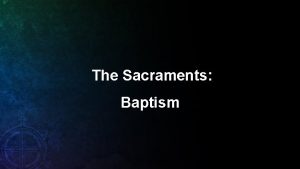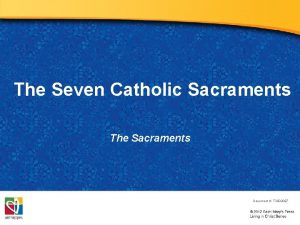MEETING JESUS IN THE SACRAMENTS CHAPTER 7 THE
















- Slides: 16

MEETING JESUS IN THE SACRAMENTS CHAPTER 7 THE SACRAMENT OF THE ANOINTING OF THE SICK

“Is Anyone Among You Suffering” Why me? Why do I suffer? Why is there illness and suffering in the world? Why does God permit such pain?

Suffering and the Old Testament Before God people lamented their illness and viewed the Lord as the ultimate Master of life and death. Early Israelites believed further that all suffering directly resulted as punishment for sin. Later, people understood that the faithful needed to endure sufferings patiently.

Christ the Physician Jesus treated the person’s physical illness as well as the person’s soul by offering forgiveness for his or her sins. Jesus rejected the idea that suffering is a punishment for sin.

Jesus Explains Suffering § Sickness and death are not God’s way of punishing us. § God loves the sick and disabled just as much as he loves healthy people. § God’s love is stronger than sickness, pain, suffering, and death. § God does not abandon us when we are sick or suffering. § The sick should not be treated as outcasts; instead, they have an important role to play in the community.

The Healing Ministry of Jesus § Physical illness and disability, through physical cures. § Domination by Satan or demons or psychological illness, through exorcisms. § Grief for a loved one, through resuscitations.

The Church Heals the Sick Jesus’ disciples healed the sick while preaching the Good News. The Church took up the practice of having presbyters lay hands and anoint with oil, in imitation of Jesus and the Apostles.

Understanding the Sacrament of the Anointing of the Sick Jesus gave the Sacrament of the Anointing of the Sick to aid those who are seriously ill and help them use their illnesses in service of Christ.

A Brief History of the Sacrament In the early centuries, Christians would gather around and pray for him or her and then rub blessed oil on body parts that needed healing By the 13 th century, the Sacrament became know as extreme unction—“last anointing”—and was only given when death seemed imminent During Middle Ages, a priest was at deathbeds of the dying to ensure safe departure into the afterlife

Changes after Vatican II In reforming the sacrament, the Council embraced both of the traditional meanings of the sacrament: § It is a sacrament of the sick with an emphasis on healing and faith in God’s presence in suffering. § It is a sacrament of the dying to prepare people for death.

Celebrating the Sacrament of the Anointing of the Sick A priest is the minister of the sacrament Those who are dangerously ill due to sickness or old age should be given special attention and receive the sacrament.

Rite of Anointing § Introductory Rites § Liturgy of the Word § Litany or Prayer of the Faithful § Laying on of Hands § Blessing of Oil § Prayer of Thanksgiving § Anointing with Oil § Prayer after the Anointing

Viaticum “Food for the Journey” Viaticum is a separate liturgical rite for those who are dying—it is the person’s last reception of the Eucharist Penance, Anointing, and Viaticum are the “last rites” for Catholics on their way to God

The Grace of the Anointing of the Sick § The sacrament is a particular gift of the Holy Spirit. § The sacrament provides a grace to unite with the Passion of Christ. § The sacrament is a grace for the Church —the Church participates in the ministry of Christ. § The sacrament is a preparation for the final journey (sacramentum exeuntium).

How We Live the Effects of the Sacrament From Self-Centeredness to God-Centeredness From Self-Centeredness to Other-Centeredness This sacrament helps us to see sickness and suffering as opportunities for growth in holiness. This sacrament helps us to sacrifice ourselves for others because we have received God’s love.

Blessed Mother Teresa of Calcutta Founder of the Missionaries of Charity “The poor you may have right in your own family. Find them. Love them. Speak tenderly to them. Let there be kindness in your face, in your eyes, in your smile, in the warmth of your greeting. Always have a cheerful smile. Don’t only give your care, but give your heart as well. ”
 Meeting jesus in the sacraments chapter 1
Meeting jesus in the sacraments chapter 1 Meeting jesus in the sacraments
Meeting jesus in the sacraments Ad altare dei answer key
Ad altare dei answer key Meeting jesus in the sacraments chapter 2
Meeting jesus in the sacraments chapter 2 Meeting jesus in the sacraments chapter 4
Meeting jesus in the sacraments chapter 4 Jesus jesus jesus sweetest name i know
Jesus jesus jesus sweetest name i know Jesus in the morning
Jesus in the morning For today's meeting
For today's meeting Proposal kickoff meeting agenda
Proposal kickoff meeting agenda What is meeting and types of meeting
What is meeting and types of meeting What is meeting and types of meeting
What is meeting and types of meeting Sacrament symbol
Sacrament symbol Sacrament of vocation
Sacrament of vocation Symbols for reconciliation
Symbols for reconciliation The sacraments source of our life in christ
The sacraments source of our life in christ 7 sacraments catholic
7 sacraments catholic Signs and symbols of holy matrimony
Signs and symbols of holy matrimony
